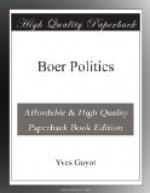The complaints of the British Government on behalf of the mining industry of the Transvaal, were founded solely upon the statement of the Volksraad Commission itself. This mania of the Government for a monopoly by which the shareholders profit greatly and the State hardly at all, proves that there are other interests at stake than those of the public.
At its meeting on February 3rd, 1899, the Witwatersrand Chamber of Mines decided to guarantee a Government loan of L600,000 at 5 per cent., to be applied in buying-out the concessionaires of the dynamite monopoly.
3.—Railways.
A concession for all the State railways was granted on April 16th, 1884, to a group of Hollander and German capitalists, and confirmed by the Volksraad on August 23rd following. In 1887 the shares, to the number of 2,000, representing a capital of L166,666, were held as follows:—
By Germans 819 shares carrying 30 votes. " Hollanders 581 " " 76 " " The Republic 600 " " 6 "
This astonishing division of votes which gave to the Transvaal Government 6 out of 112, although it subscribed one-third of the capital, and assured to the Hollanders twice as many votes as the other holders put together, although they only provided one-third of the capital, was the work of Dr. Leyds. The contract for the construction of the first 70 miles is not less surprising. Messrs. Van Hattum & Co. were to build the line, at a cost mutually to be agreed upon by them and the railway company; and they were to receive as remuneration 11 per cent. upon the amount of the specification. The 11 per cent. was to be proportionately decreased by a sliding scale so arranged that it disappeared by the time Van Hattum & Co. had exceeded the contract price by 100 per cent. Beyond that the company had the right to cancel the contract. From this it follows, that, by deciding to lose the 11 per cent., Messrs. Van Hattum could make a gain of 89 per cent. This they did, and whole sections of earthworks, which should not have cost L8,000 per mile, cost L23,000 instead. A thousand Hollanders were brought out to work on the line; and sent home again at the expense of the Government. In a country which abounded in stone, the Komati Bridge was built of dressed stone imported from Holland, with the cost of a transit of 7,000 miles.
4.—The Drift Question.
The Cape Colony Free State Railway ends at the Vaal River, 50 miles from Johannesburg. Thence goods are transmitted by the Netherlands Railway at a charge of 8-1/2d. per ton per mile, the rate being 3d. over the rest of the line.
In order to escape this rate manufacturers resorted to the use of ox-wagons; Mr. Krueger forbade them the drifts in order to compel the transit of goods by railway. This was another flagrant violation of Article 14 of the Convention of 1884, which called forth the intervention of Mr. Chamberlain. The indignation at the Cape was so great, that Mr. Chamberlain having asked the Cape Government, whether, in the event of war resulting, it would pay half the cost, and undertake the transport of the troops by the railways, the proposal was accepted by an Afrikander minister! Mr. Krueger yielded and re-opened the drifts.




